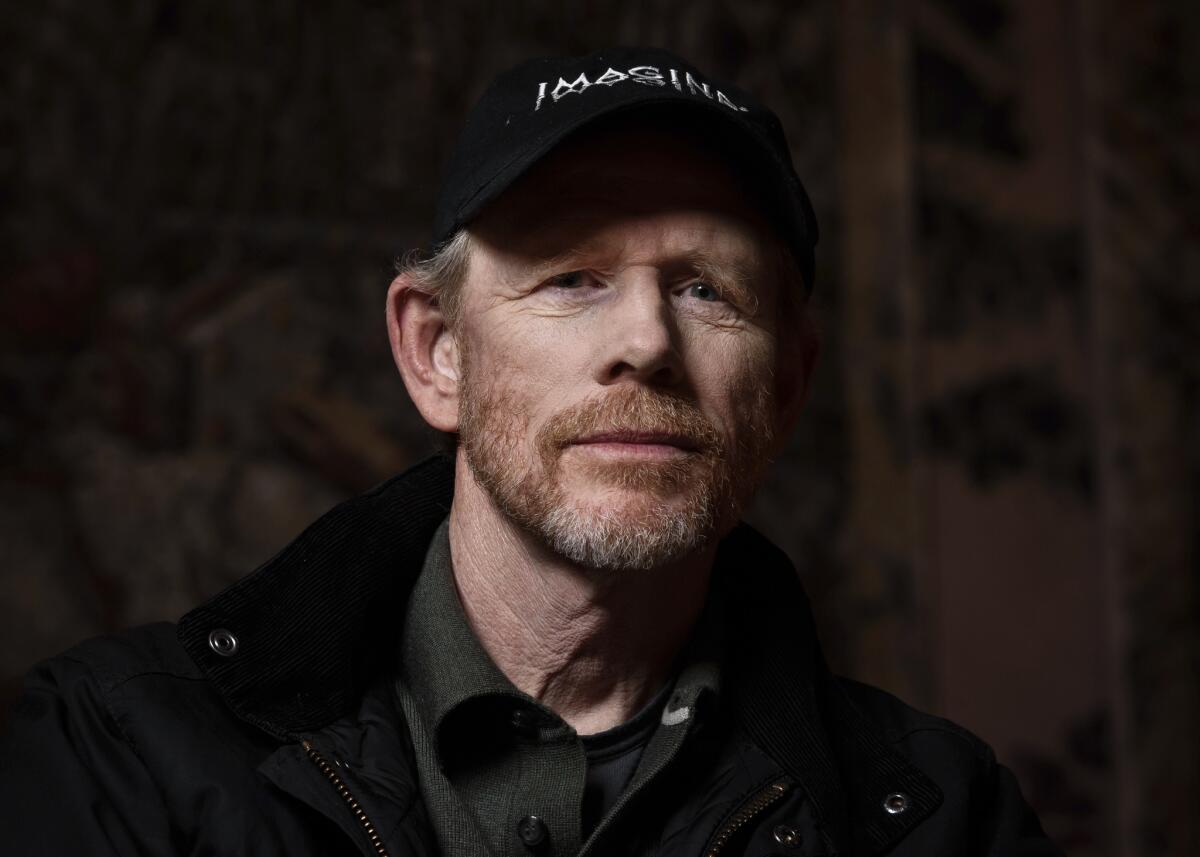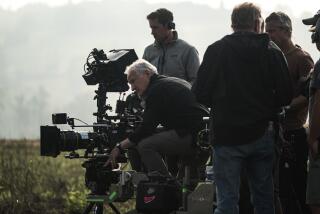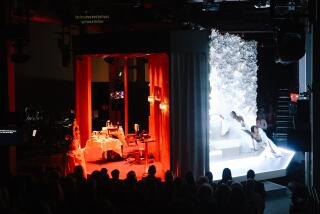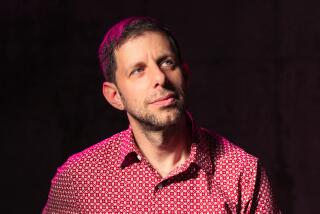Ron Howard’s latest music documentary shines a light on opera superstar Pavarotti
Taking inspiration from his friends Martin Scorsese, Spike Lee and the late Jonathan Demme, Ron Howard has moved into the music documentary sphere. In 2013 he directed the Jay-Z concert doc “Made in America,” and in 2016 he chronicled history’s most famous rock band in “The Beatles: Eight Days a Week — The Touring Years.”
Now he’s made one about the most famous opera singer of the 20th century. “Pavarotti,” which opens Friday, is a comprehensive look at the singer’s operatic life and unparalleled artistry, using concert footage, home movies and new interviews with family members and showbiz colleagues like Bono, who was amusingly arm-twisted into writing a collaboration song for U2 and Pavarotti in 1995.
Howard hasn’t stopped making scripted features — his next film is an adaptation of the 2016 memoir “Hillbilly Elegy” starring Amy Adams and Glenn Close — but he’s getting even more serious about documentaries. Imagine Entertainment, his production company with Brian Grazer, recently started a whole division dedicated to the art form, which Howard says nourishes and stimulates his other directing work.
We spoke with him about delving into the opera world, why Pavarotti made for good drama and how great singers are like Michael Jordan. This transcript has been edited for brevity and clarity.

Opera seems a harder sell than the Beatles.
[Laughs] Well, I wouldn’t have characterized myself as a fan. I have an appreciation. But also, an early, early premise really began when I started reading the lyrics and the synopsis of the operas. I began to say, “I think if we choose the right aria, and a performance where he’s at the age of something that he’s living through, we can help tell the story through his performances. I thought that would help me as a storyteller and also engage audiences, and allow them to recognize, you know, it is popular entertainment — it’s about the human experience. There’s that period where he’s in a bit of malaise and we have Pagliacci’s sad clown aria — I mean, of course he’s performing it. But I have a feeling he gets it.
What has led you into this phase of music documentaries?
“Made in America” was really a lark. Brian Grazer had a relationship with Jay-Z and Steve Stout, who was the producer of the event, and wanted to cover it behind the scenes. It was like two weeks to go, and it was perfect timing for me — I was in post-production on “Rush” at that moment and could just go cover it over the weekend. And I just took a leap with that and hung my hat on a point of view that we should approach it like a Robert Altman movie, like “Nashville.” Let’s cover the story and then find the structure later.
And I really enjoyed it. But I did feel that, at the very least, we’re going to have great music to entertain people with. And I certainly felt that with the Beatles — although I was terrified to take on that subject. I did it kind of glibly at first, and I thought, I’ll get to meet Paul and Ringo, and that’ll be cool. And then, all of a sudden when I realized what it meant to people and started looking online at how everyone was reacting, I felt that pressure. But again, I knew we had the music. With Pavarotti, even though the music wouldn’t be as popular, I knew it was great, and I knew enough to know that these performances could be really riveting to watch.
Did you know much about his life prior to tackling this?
No. It really was the same team that did the Beatles documentary — Nigel Sinclair, the producer, Paul Crowder, the editor, and Mark Monroe, producer-writer. We had such a good chemistry that we wanted to find another subject. So Nigel, who’s done a lot of excellent music documentaries, said, “What about Pavarotti?” So I started reading chapters from books, and articles, and we pulled a few performance moments. It’s an interesting life; it’s a relatable life. As rarefied as his work was, as an individual and as a spirit there was something to celebrate — and yet there were foibles and missteps along the way too, so there was real good drama there. It was kind of an opera, in a way, his life. In fact, if I were a journalist who could meet him today, or interview him for his own documentary, I think I would probably say: “How much do you think the narrative twists and turns of the operas that you came to know so well might have influenced your decision-making and your philosophy?” Because his life had a lot of big swings.
Obviously you have to find a subject who’s interesting, but it also has to be something where you have compelling footage and material.
Well, he was unbelievably charismatic and telegenic, and he rose to stardom at a time when he was covered nonstop. We already knew there was this great, glamorous Princess Diana sequence, the concert in the park in the rain with all of these people. We didn’t know that it was kind of a pivot point in his life — that’s something that we discerned later, as we were just looking at timelines and editing and looking at scenes, and also getting feedback from our interviews.
The interviews, I found, really do shape the tone of these kinds of films. If you’re not going to be like Michael Moore and sort of narrate the documentary — if you’re letting the interviews and the characters and the footage tell the story, then you’re really dependent on what it is you can learn, what people actually say.
What this documentary helped land for me was, these people are really Olympians.
I share that completely. The first time I was understanding it and hearing some of the singers talk about what’s required to reach those notes, and thinking about the six years that he trained, I thought, well, this is a little bit like when you first saw that commercial where Michael Jordan took off at the free throw line and slam dunked. It was like: I didn’t know human beings could actually do that. That is the way you feel about what they’re able to achieve — and yet express an idea, a feeling, an emotion.
How is documentary-making rewarding, as compared to directing a feature film?
It’s an exploration with a small group of very interesting people. And while there’s an ongoing office that’s open, and researchers are researching, and the editor is editing, there’s this gathering going on. This is what a lot of my movie-directing friends kept explaining to me: You can do this, and it’s almost refreshing. You come back to this other story that you also care about, and then you go back to the one that has all the deadline pressure and the big budget and the stress. You can also borrow from it. For me, as a storyteller and a director at this point, the creative problem-solving is a little different, and yet the goals are very similar. Plus, I just love the hang. I love the people who are dedicated to documentaries and I love the conversations — whether they’re the initial conversations, the research conversations or I’m there for the interviews. I’m not a great interviewer because I’m not tough enough [laughs].
Who did the interviews on this?
I did some. But even when I do them, Mark Monroe or Paul Crowder assist. [Monroe] is a really great interviewer — he did a lot of them. My approach is just to be as kind as I can possibly be, which works pretty well. My daughter, Bryce, is directing a documentary right now about fatherhood. It’s just called “Dads.” She interviewed me, and, man, she got me emotional — and that never happens to me in an interview, but it was my daughter!
Has this exercise of sifting through someone’s life, and determining what their legacy is, got you thinking about your own legacy?
No. Because, fortunately, my life’s without controversy — pretty much — and I don’t think anybody’s ever going to need to make a documentary or a scripted movie about my life. And that suits me beautifully [laughs].
You said you’d want to ask Pavarotti if his art influenced his life. Do you feel like that’s been the case for you at all?
Yeah, I think so. When you’re constantly thinking about themes and ideas and choices that characters make, and why they make them — I think inherent in that is a constant reevaluation of your own problem-solving process. Years ago I started saying to my kids, when they’re at a crossroad: “If you were sitting there watching a movie or a television show, and the character is at the crossroad you’re at now, what are you rooting for?” It’s simplistic, but it’s worth adding to the litmus test. If we’re lucky, we have agency. And it’s important to, I think, exercise that with consciousness and awareness.
More to Read
Only good movies
Get the Indie Focus newsletter, Mark Olsen's weekly guide to the world of cinema.
You may occasionally receive promotional content from the Los Angeles Times.










